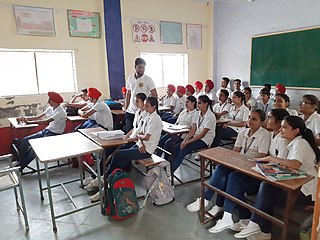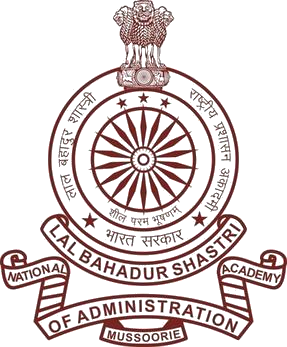Related Research Articles

Education in India is primarily managed by the state-run public education system, which falls under the command of the government at three levels: central, state and local. Under various articles of the Indian Constitution and the Right of Children to Free and Compulsory Education Act, 2009, free and compulsory education is provided as a fundamental right to children aged 6 to 14. The approximate ratio of the total number of public schools to private schools in India is 10:3.

Triloki Nath Chaturvedi spent almost 70 years of his life in the administrative and political system of independent India. He was a member of the Indian Administrative Service (IAS), held the constitutional position of Comptroller & Auditor General of India, was an elected member of the Indian Parliament, and was appointed by the President of India to the constitutional office of Governor of Karnataka and Kerala. He was honored with the Padma Vibushan for public service in 1991. He was associated with numerous academic, research, literary and philanthropic institutions as a member and in various leadership capacities.
The abbreviation IIPA may refer to:

Lal Bahadur Shastri National Academy of Administration (LBSNAA) is a civil service training institute on public policy and public administration in Musoorie, Uttarakhand in India. The academy's main purpose is to train civil servants of the IAS cadre and also conduct the Foundation Course of Group-A Central Civil Services. After completion of training, the trainee officers of IAS cadre are awarded an MA from Jawaharlal Nehru University. It has been functioning under the Ministry of Personnel, Public Grievances and Pensions since 1985.
Department of Higher Education is the department under Ministry of Education, that oversees higher education in India.

Vidya Bharati is the educational wing of Rashtriya Swayamsevak Sangh (RSS). It runs one of the largest private network of schools in India, operating 12,000 schools with over 3.2 Million students, as of 2016 and has its registered headquarters in Lucknow with a functional headquarters in Delhi and a sub-office in Kurukshetra. In the year 2020, the million lives club selected Vidya Bharati as an official member of Vanguard cohort for its contribution to school education.
The National Policy on Education (NPE) is a policy formulated by the Government of India to promote and regulate education in India. The policy covers elementary education to higher education in both rural and urban India. The first NPE was promulgated by the Government of India by Prime Minister Indira Gandhi in 1968, the second by Prime Minister Rajiv Gandhi in 1986, and the third by Prime Minister Narendra Modi in 2020.

The Bureau of Police Research and Development (BPR&D) was set up on the 28th of August, 1970, to further the objectives of the Government of India regarding the modernization of police forces. It has since evolved into a multifaceted consultancy organization. At present it has 4 divisions – Research, Development, Training and Correctional Administration.
Krishna Kumar is an Indian intellectual and academician, noted for his writings on the sociology and history of education. His academic oeuvre has drawn on multiple sources, including the school curriculum as a means of social inquiry. His work is also notable for its critical engagement with modernity in a colonized society. His writings explore the patterns of conflict and interaction between forces of the vernacular and the state. As a teacher and bilingual writer, he has developed an aesthetic of pedagogy and knowledge that aspires to mitigate aggression and violence. In addition to his academic work, he writes essays and short stories in Hindi, and has also written for children. He has taught at the Central Institute of Education, University of Delhi, from 1981 to 2016. He was also the Dean and Head of the institution. From 2004 to 2010, he was Director of the National Council of Educational Research and Training (NCERT), an apex organization for curricular reforms in India. He was awarded the Padma Shri by the President of India in 2011.
National Institute of Disaster Management (NIDM) is an Indian education and research institution located in Connaught Place, New Delhi. NIDM is primarily responsible for the training and capacity development programs for managing natural disasters in India.

Education in Mizoram consists of a diverse array of formal education systems ranging from elementary to university, from training institution to technical courses. The Government of India imposes mandatory education at least up to the basic level. For this public schools are made free of fees, and provided with free textbooks and school lunch.
Rashtriya Madhyamik Shiksha Abhiyan (RMSA) is a centrally sponsored scheme of the Ministry of Human Resource Development, Government of India, for the development of secondary education in public schools throughout India. It was launched in March 2009. The implementation of the scheme has started from 2009–2010 to provide conditions for an efficient growth, development and equity for all. The scheme includes a multidimensional research, technical consulting, various implementations and funding support. The principal objectives are to enhance quality of secondary education and increase the total enrollment rate from 52% to 75% in five years, i.e. from 2009 to 2014. It aims to provide universal education for all children between 15 and 16 years of age. The funding from the central ministry is provided through state governments, which establish separate implementing agencies. The total budget allocated during the XI Five Year Plan (2002-2007) was ₹2,012 billion (US$25 billion).
Padmakar Ramachandra Dubhashi was an Indian civil servant, administrator, author, social scientist and academician, known for his administrative and academic abilities. He was a pioneer of Cooperative movement and was instrumental in housing the Goa University in a new campus, a feat he accomplished during his tenure as the Vice-Chancellor of the university. The Government of India honoured him, in 2010, with Padma Bhushan, the third highest civilian award, for his services to the nation.
Anil Bordia was an Indian educationist, social activist and former civil servant, widely respected for his contributions to the Indian education sector. The Government of India honoured him, in 2010, with Padma Bhushan, the third highest civilian award, for his services to the fields of education and literature on education.

Harish Chandra Verma, popularly known as HCV, is an Indian experimental physicist, author and emeritus professor of the Indian Institute of Technology Kanpur. In 2021, he was awarded the Padma Shri, the fourth highest civilian award, by the Government of India for his contribution to Physics Education. His field of research is nuclear physics.
Gutta Muniratnam was an Indian social worker, a member of the National Planning Commission of India and the founder of Rashtriya Seva Samithi (RASS), a non governmental organization engaged in the social welfare activities in over 2500 socio-economically backward villages in the Rayalaseema region, spread across the present day states of Andhra Pradesh and Telangana. He was honored by the Government of India, in 2012, with the fourth highest Indian civilian award of Padma Shri.

Ashok Bhan is a retired Indian Police Service officer (J&K-1976). A PhD in Botany, Dr. Bhan held important positions in Jammu and Kashmir State Government including that of the Commissioner of Vigilance, Director General of Police (Intelligence) and Director General of Police (Prisons). After his retirement, he served as a Member of the National Security Advisory Board (2010-2012). During his service career he acquired expertise in Anti — Terrorist operations, Intelligence and Anti-Corruption, Issues related to governance, Security of VIPs and Vital Installations, Recruitment and Training.
He is currently a Member of Shri Mata Vaishno Devi Shrine Board, Patron, J&K Regional Branch, Indian Institute of Public Administration; Member University Court, Central University of Jammu and Distinguished Fellow, Institute of Peace and Conflict Studies, New Delhi.
SSR Institute of Management and Research is a Management education college located in Silvassa in the Union Territory of Dadra and Nagar Haveli and Daman and Diu. The late Mohanbhai Sanjibhai Delkar Lok Sabha MP established the college as one of four colleges in the SSR Memorial Trust including the SSR College of Arts, Science and Commerce. The foundation stone was laid by the Mohanbhai Sanjibhai Delkar in 2003.
Kamta Prasad, is an Indian economist, author, and professor with a career spanning over 60 years. He has published over 20 research books and has contributed to over 150 research papers.
References
- ↑ "About – IIPA" . Retrieved 26 September 2021.
- ↑ "Shiksha: Indian Institute of Public Administration". Shiksha (NGO) . 11 December 2019. Retrieved 1 November 2020.
- ↑ https://www.iipa.org.in/cms/public/managements